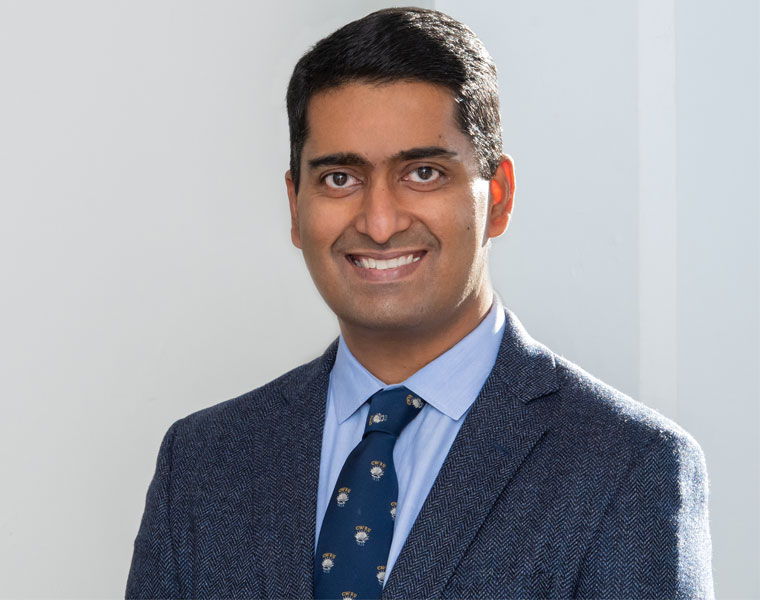From the time he graduated with his PhD from Case Western Reserve in 2004, Rohan Akolkar knew he wanted to impact the world through his research. He spent eight years in industrial research and development at Intel Corporation before returning to the university to teach and pursue research in his own lab—work that has now earned him two distinct honors from The Electrochemical Society (ECS).
Akolkar was among 13 renowned scientists and engineers named to the 2024 class of ECS Fellows, a recognition of scientific achievements, leadership, and active participation in ECS affairs. The nonprofit professional society, which supports scientific inquiry in the field of electrochemistry and solid-state science and technology, selects a small cohort of fellows annually.
“Because of my experiences in industry, my goal always is to look for solutions to problems that eventually can have a practical technological and societal impact,” said Akolkar, now the Milton and Tamar Maltz Professor of Energy Innovation in the Department of Chemical and Biomolecular Engineering at CWRU.
His lab focuses on electrochemistry applications for sustainable manufacturing, including developing environmentally friendly metal production processes.
Additionally, the ECS Board of Directors appointed Akolkar the inaugural editor-in-chief of ECS Advances, a Gold Open Access journal covering all technical areas supported by ECS.
“I think it’s very important to realize that electrochemistry on the [CWRU] campus has been strong for many decades,” Akolkar said. “Many of the prominent electrochemical scientists who have worked here were elected as ECS fellows. So, my recognition as an ECS fellow is very special to me from that point of view.”
Finding a salty solution
Akolkar’s work recently has focused on molten salt electrolysis, a process of heating salt to a high enough temperature that it melts into a molten pool of ions, which is a very conductive medium for electrochemistry.
This idea is central to his work on sustainability. Akolkar and his team spent years finding the right composition of the molten salt and the right materials they wanted to process.
Ultimately, they settled on neodymium, an element that the United States government has deemed “a critical material”—a substance essential to energy technologies, economic and national security, and the manufacturing of key products. These high-demand materials may have supply chains at risk of being interrupted by foreign affairs or natural disasters.
China produces most of the world’s neodymium, which is needed for making magnets. This may sound like a niche application, Akolkar said, but it’s not. Without magnets, you can’t build electric cars, wind turbines, electronic gadgets or fighter jets—to name just a few items.
“Whether you think of clean energy or defense applications, you need access to this material,” Akolkar said.
Recognizing neodymium’s importance and the significance of Akolkar’s work to sustainable manufacturing, the Department of Energy is currently his lab’s biggest sponsor, with grants totaling nearly $5 million. The lab also receives support from industry and national laboratories such as Lawrence Livermore National Laboratory and Argonne National Laboratory.
Bringing ideas to market
With lessons learned, Akolkar and his team have partnered with the CWRU Technology Transfer Office to protect their intellectual property and spin out a small business to work toward commercialization. Specifically, Akolkar has co-founded a CWRU startup, Galvanix, with a former student.
“We’re continually developing new intellectual property, and it is closer to seeing the light of day in the sense that it may one day actually be a commercial product,” he said.
These developments also helped influence Akolkar’s induction among the 2024 ECS Fellows, with the society citing several of Akolkar’s contributions to fundamental and applied electrochemistry. These include “patented electrochemical processes and materials which enabled high-performance interconnects in advanced semiconductor devices; novel electrowinning and electrorefining processes for the extraction and recycling of metals; fundamental studies unraveling mechanisms of dendrite formation in batteries; and a novel sensor for detecting heavy-metal contaminants in water.”
Akolkar began attending ECS meetings as a student at CWRU more than 20 years ago. He remembers looking up to all the prominent scientists in attendance.
“It was inspiring to be at ECS meetings as a student, and this helped me establish long-term connections with this society for which I am incredibly grateful,” he said.
Akolkar is also an Ohio Eminent Scholar in Advanced Energy Research, serves as faculty director of the CWRU Great Lakes Energy Institute, and holds a joint appointment as Chief Scientist at the Pacific Northwest National Laboratory.


